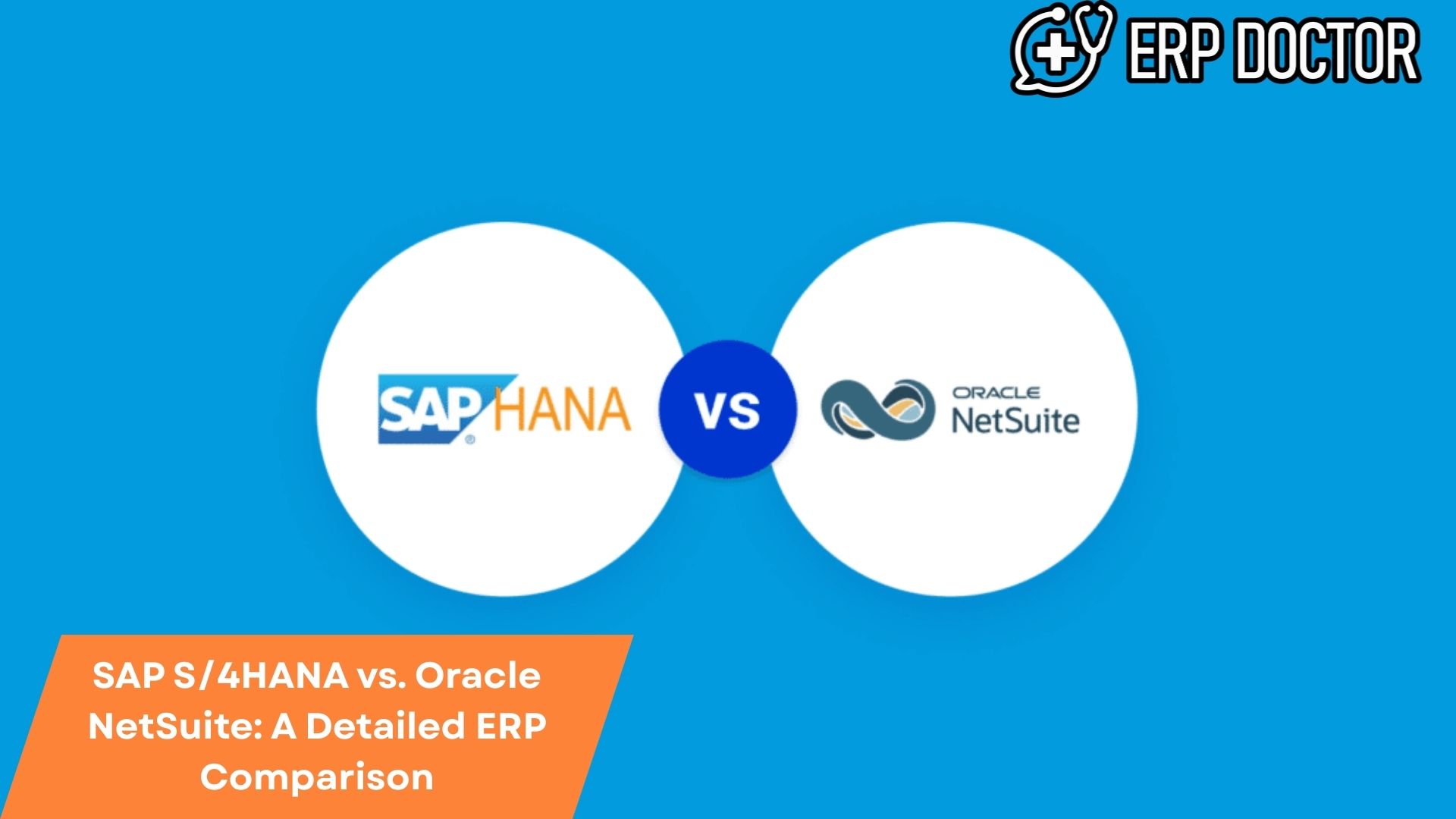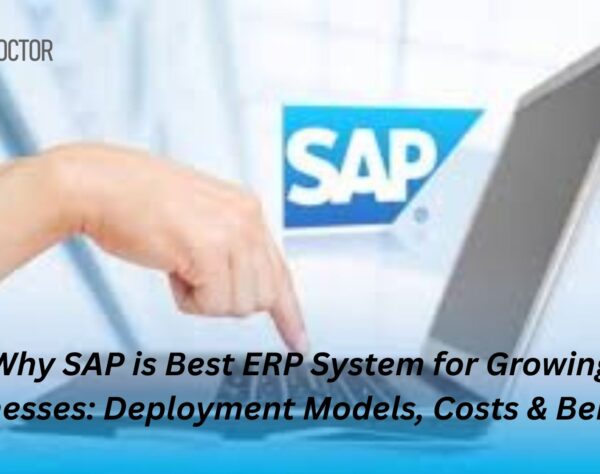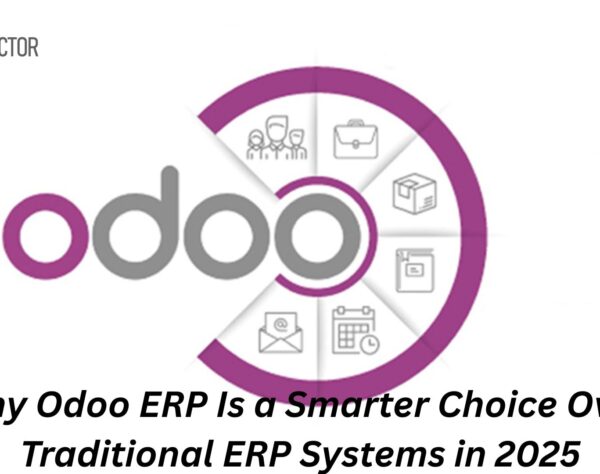
SAP S/4HANA vs. Oracle NetSuite: A Detailed ERP Comparison

SAP S/4HANA vs. Oracle NetSuite: Which ERP Solution Fits Your Business Best?
In today’s competitive business landscape, selecting the right ERP system can significantly impact an organization’s efficiency, scalability, and bottom line. Among the leading ERP solutions available, SAP S/4HANA and Oracle NetSuite stand out as two of the most popular choices for enterprises. While both platforms offer advanced features and functionalities, they cater to different business needs and industries. Understanding their core differences can help businesses make an informed decision about which ERP system best fits their requirements.
This blog provides an in-depth comparison of SAP S/4HANA and Oracle NetSuite, analyzing their features, advantages, and ideal use cases to help you determine which solution is right for your business.
Why Choosing the Right ERP Matters
Selecting the right ERP system is critical for business growth and operational efficiency. SAP S/4HANA and Oracle NetSuite offer enterprise-grade solutions that streamline processes, improve data visibility, and empower organizations to scale seamlessly. However, the differences in their deployment models, customization options, and target industries make it essential to carefully evaluate which solution best aligns with your company’s needs.
Key Features Comparison: SAP S/4HANA vs. Oracle NetSuite
1. Deployment Options
SAP S/4HANA:
- Available in on-premise, cloud, and hybrid deployment models.
- Ideal for enterprises that prefer greater control over data security and infrastructure.
Oracle NetSuite:
- Cloud-native ERP solution with a fully managed SaaS model.
- Best suited for growing mid-market businesses and global enterprises seeking a scalable cloud-based solution.
2. Scalability and Flexibility
SAP S/4HANA:
- Designed for large enterprises with complex business processes.
- Scales easily to support multinational operations and high transaction volumes.
Oracle NetSuite:
- Highly scalable and flexible, making it suitable for small to mid-sized businesses and growing enterprises.
- Modular structure allows businesses to add functionalities as needed.
3. Customization and Extensibility
SAP S/4HANA:
- Provides extensive customization options through SAP’s advanced development environment.
- Allows deep integration with third-party applications and SAP’s industry-specific modules.
Oracle NetSuite:
- Offers customization through SuiteScript and SuiteBuilder tools.
- Flexibility to tailor workflows and processes but with fewer options than SAP S/4HANA for large enterprises.
4. User Interface and Usability
SAP S/4HANA:
- Features a robust but complex interface with SAP Fiori for an enhanced user experience.
- Requires initial training due to its extensive functionalities.
Oracle NetSuite:
- Modern, intuitive interface with drag-and-drop features.
- Easier to navigate, making it more user-friendly for new users.
5. Pricing and Total Cost of Ownership (TCO)
SAP S/4HANA:
- Higher initial investment and long-term maintenance costs.
- Best suited for large organizations with the budget to invest in a robust ERP solution.
Oracle NetSuite:
- Subscription-based pricing with lower upfront costs.
- Affordable for small and mid-sized businesses with predictable cost structures.
Advantages of SAP S/4HANA and Oracle NetSuite
SAP S/4HANA Advantages
- Enterprise-Grade Scalability: Handles complex workflows and large-scale operations.
- Real-Time Data Analytics: Leverages in-memory computing for faster data processing.
- Advanced Compliance and Security: Ensures industry-specific compliance with strict security protocols.
- Seamless Integration with SAP Ecosystem: Connects with SAP’s suite of applications for extended functionality.
Oracle NetSuite Advantages
- Cloud-Native Flexibility: Fully managed cloud solution ensures seamless upgrades and maintenance.
- Faster Implementation: Quicker deployment with fewer infrastructure requirements.
- Cost-Effective for SMEs: Affordable pricing models suitable for small and mid-sized businesses.
- Extensive Suite of Business Modules: Includes CRM, eCommerce, and financial management in a unified platform.
Ideal Use Cases: When to Choose SAP S/4HANA or Oracle NetSuite
When to Choose SAP S/4HANA
- Large enterprises with complex business processes requiring advanced functionality.
- Organizations in manufacturing, retail, or distribution that need high-performance analytics and data processing.
- Businesses that require on-premise or hybrid deployment models for enhanced data control.
When to Choose Oracle NetSuite
- Mid-sized companies seeking a cloud-native, scalable ERP solution.
- Growing businesses that require flexibility, rapid deployment, and cost-effective subscription models.
- Organizations looking for a unified platform that integrates ERP, CRM, and eCommerce capabilities.
SAP S/4HANA vs. Oracle NetSuite: Pros and Cons
SAP S/4HANA Pros and Cons
Pros:
- Comprehensive enterprise-grade functionalities
- High level of customization and extensibility
- Real-time data insights for faster decision-making
Cons:
- Higher implementation costs
- Steeper learning curve for new users
- Longer deployment times
Oracle NetSuite Pros and Cons
Pros:
- Faster deployment and easier maintenance
- Cost-effective subscription models
- Scalable and flexible for growing businesses
Cons:
- Limited customization compared to SAP S/4HANA
- Less suitable for complex enterprise processes
- Reliance on Oracle’s cloud infrastructure
Final Verdict: Which ERP is Best for Your Business?
Both SAP S/4HANA and Oracle NetSuite offer powerful ERP capabilities, but the best choice depends on your business size, budget, and growth trajectory.
- SAP S/4HANA is ideal for large enterprises that require deep customization, scalability, and real-time analytics.
- Oracle NetSuite is better suited for small to mid-sized companies seeking a cloud-native, easy-to-implement ERP solution.
Carefully assess your organization’s operational needs and future goals to select the ERP that aligns with your long-term business objectives.
FAQs
1. How does SAP S/4HANA differ from Oracle NetSuite in terms of scalability?
SAP S/4HANA handles large-scale enterprise operations, while Oracle NetSuite is more suited for mid-sized businesses.
2. Which ERP offers better deployment flexibility, SAP S/4HANA or Oracle NetSuite?
SAP S/4HANA supports hybrid and on-premise models, whereas Oracle NetSuite is a fully cloud-based ERP.
3. Is Oracle NetSuite more cost-effective than SAP S/4HANA?
Yes, NetSuite offers a subscription-based pricing model, making it more affordable for SMEs compared to SAP S/4HANA’s higher initial costs.
4. Can SAP S/4HANA and Oracle NetSuite be customized for specific industries?
Yes, both offer industry-specific modules, but SAP S/4HANA provides deeper customization capabilities.
5. Which ERP offers better real-time analytics and data insights?
SAP S/4HANA leverages in-memory computing for faster real-time analytics, while NetSuite’s cloud platform provides basic data insights.
6. Is Oracle NetSuite easier to implement than SAP S/4HANA?
Yes, NetSuite’s cloud-native architecture makes it faster to deploy and easier to maintain compared to SAP S/4HANA.
7. Can both SAP S/4HANA and Oracle NetSuite integrate with third-party applications?
Yes, both ERP systems support integration with third-party applications, though SAP S/4HANA offers more seamless connectivity with SAP’s ecosystem.
8. Which ERP system is better suited for global businesses with multiple subsidiaries?
SAP S/4HANA is better equipped to handle complex global operations, whereas Oracle NetSuite is suitable for multi-subsidiary mid-sized businesses.
9. Does Oracle NetSuite offer more user-friendly interfaces than SAP S/4HANA?
Yes, NetSuite’s modern, intuitive interface is easier for new users, while SAP S/4HANA has a steeper learning curve.
10. Which ERP has better long-term support and maintenance?
SAP S/4HANA benefits from SAP’s global partner network, offering stronger long-term support compared to Oracle NetSuite.







